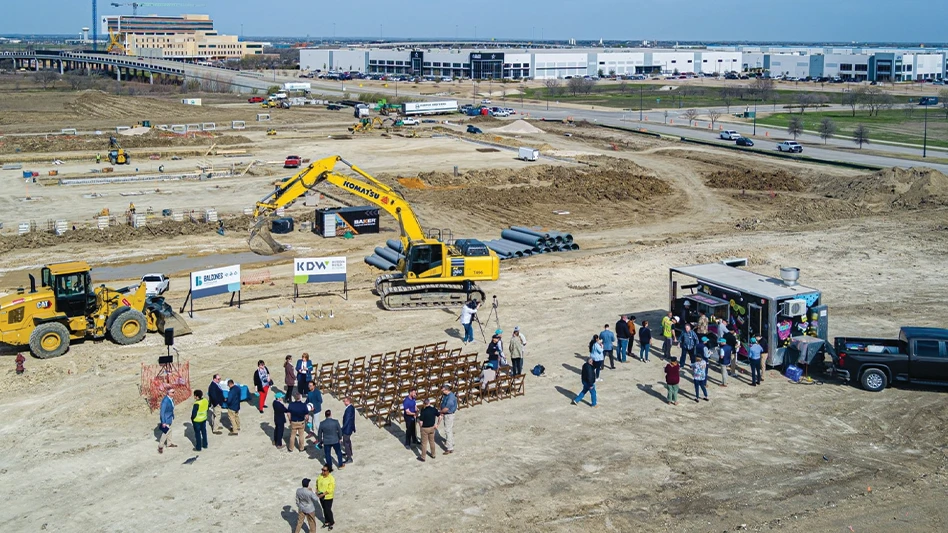Sims Metal Management Reports Strong Numbers for Fiscal Year
Sims Metal Management, based in Australia, has reported net profit after tax for the 2008 fiscal year ended June 30, 2008, of A$433.2 million (Australian dollars), up 81 percent from the same time the previous year. The figures include a contribution from the former Metal Management business for the period from March 14 through June 30, 2008, and reflects robust market conditions in the second half of the year, according to the company, resulting in record ferrous contributions, particularly from the company’s North American business.
The company also reported that earnings before interest, tax, depreciation and amortization (EBITA) were up 69.3 percent from 2007’s fiscal year to A$777.9 million. Sales revenue was up 38.2 percent compared to the prior year to A$7.67 billion. Sales tonnage increased by 22 percent to 11.7 million metric tons, mainly reflecting the contribution from the former Metal Management business in the fourth quarter. Net profit after tax for the quarter was A$250.6 million, and EBITDA was $420.8 million, up 212 percent and 189 percent, respectively, for the quarter ended March 31, 2008.
"Fiscal 2008 was a remarkable year, with record performance and outstanding growth," says Daniel Dienst, Sims Metal Management’s CEO. "The merger between Sims Group and Metal Management was the obvious highlight, but a further eight acquisitions were completed during the year across all regions in both metal recycling and e-recycling," he adds. "The Sims-Adams joint venture in Southern California, which was established in the first half of the year, has already delivered significant value and offers great opportunity for future growth."
Market conditions in North America were favorable during the second half of the year, according to the company. Sales revenue was up 56.8 percent on the prior year to A$4.61 billion but, in U.S. dollar terms, it was up by 82.8 percent. Similarly, on a comparative basis, EBIT (pre-amortization of intangibles) was up 137.6 percent to A$437.4 million, with the increase being 175.3 percent.
Excluding the contribution from the former Metal Management business from March 14, 2008, EBIT was up 55.9 percent to A$287 million in fiscal year 2007, with the increase being 77.6 percent in U.S. dollar terms. Total metric tons (ferrous and nonferrous) processed and brokered in North America in fiscal year 2008 increased 33 percent compared to fiscal year 2007 to about 7.9 million metric tons.
For the fourth quarter, EBIT was up by 456.2 percent to A$294.9 million relative to the previous quarter, with the increase being 456.8 percent in U.S. dollars.
Total metric tons processed and brokered in North America in the fourth quarter increased 116 percent, quarter on quarter, to approximately 3.3 million metric tons.
"The operating results from North America for the year were outstanding and mainly reflect an extremely strong ferrous performance from virtually all business units across the region, particularly in the fourth quarter," Dienst says.
Sims Recycling Solutions (SRS) continued to grow, with EBIT up 38.3 percent on the previous year to A$89.6 million and sales revenue of A$559.2 million, up 28.9 percent. The result reflected a full-year contribution from the businesses acquired in fiscal year 2007, strong metal prices (particularly for precious metals) and an initial contribution from the new "life cycle management" area of the business.
Sims Metal Management Executive Director Jeremy Sutcliffe says, "SRS’ growth continues to exceed our internal target of 25 percent per annum. The opportunities to develop this business are enormous, organically, through industry consolidation and also through internal leveraging with our metal recycling businesses."
A. Tenenbaum Co. Makes Acquisitions, Forms New Subsidiary
In addition to expanding its automobile shredding operation, A. Tenenbaum Co. Inc., based in North Little Rock, Ark., has announced the formation of a new operating subsidiary named Tenenbaum Recycling Group ("TRG") and the acquisition of three recycling centers in Arkansas.
TRG will own and operate the Tenenbaum Recycling Center in North Little Rock as well as three other recycling centers the company recently purchased in Arkansas: Tom-Bar Recycling Center in Harrison, the Tom-Bar Recycling Center in Berryville and the Hummelstein Recycling Center in Jonesboro.
"The acquisition of these thriving businesses guarantees us a substantial portion of the feedstock necessary to supply our shredding operation and to enable us to continue the supply of high-grade metal to our customers," Jack Grundfest, president of A. Tenenbaum Co., says.
Additionally, TRG has purchased a Metso 98-104 shredder with an Alstom 6,000-horsepower motor, which will be up and running in North Little Rock by late summer of 2009, according to the company. TRG also has acquired land in Rogers, Ark., on which to locate a Metso 80-104 shredder, which will be driven by an Alstom 4,000-horsepower motor.
"The acquisition of the Rogers property and the opportunity to locate an automobile shredding operation in the Northwest Arkansas corridor is an exciting development for TRG, particularly for our recycling centers and our dealers in northern Arkansas," Grundfest says.
California Legislature Passes Metal Theft Bill
The California state Assembly has passed two bills, SB 691 and AB 844, that address the issue of metal theft in the state.
The bills passed both the Senate and the Assembly overwhelmingly.
"The Legislature is acting to shut these crooks down," says Sen. Ron S. Calderon (D-Montebello), sponsor of the Senate bill.
"Senate Bill 691 includes important provisions that create disincentives to steal valuable metal, while placing additional requirements on recyclers and increased penalties on those who break the law."
The senate bill requires thumbprints of individuals selling copper, copper alloys, aluminum and stainless steal. Sellers must show government ID and proof of their current address. Recyclers who break the law face suspension or revocation of their business license as well as increased fines and jail time.
According to the senator, the California Farm Bureau, utility companies, recyclers, law enforcement, various water districts and cities are among the supporters of the Senate bill. However, the American Civil Liberties Union opposes the bill because of the thumbprinting provision.
The Assembly approved the measure 68-0.
Assembly member Tom Berryhill sponsored an identical bill, Assembly Bill 844, which also was approved by the Senate and has been sent to Gov. Schwarzenegger for signature. It would also require photo identification and a thumbprint of the seller as well as a photograph of the materials being sold.
WTSA Changes Bunker Fuel Surcharge Formula
The Westbound Transpacific Stabilization Agreement (WTSA), Oakland, Calif., has announced that it is changing how it calculates bunker fuel surcharges in the U.S.-Asia freight market following a WTSA internal review.
The new formula went into effect for dry cargo Oct. 1.
"The new formula is a significant departure from how WTSA has calculated its bunker surcharge guideline in the past," says WTSA Executive Administrator Brian Conrad.
With separate calculations for West Coast and East Coast services, Conrad says many customers will see differences in their surcharges under the new formula.
The new bunker surcharge formula tracks a single marine fuel, IFO 380, which accounts for 98 percent of fuel-related costs; eliminates the weighted average of weekly prices at 11 load ports; uses a straight average of Hong Kong and Los Angeles prices for the West Coast and Hong Kong and New York prices for the East Coast surcharge; and uses fuel price data for the three ports from www.bunkerindex.com.
A second set of changes also takes into account vessel effective capacity, westbound allocation of deadweight capacity after eastbound empty repositions; maximum capacity for loaded containers before reaching a ship’s weight limit; daily fuel consumption and one-way steaming time (excluding time in port).
Russian Company Buys Beta Steel
Novolipetsk Steel (NLMK), a large Russia-based steel producer, has signed a definitive agreement to acquire Beta Steel, a U.S. hot-rolled steel producer located in Portage, Ind. NLMK will aquire the steel mill from a private investment group for nearly $400 million. The transaction is expected to close by year’s end.
Beta Steel operates an electric arc furnace melt shop with a capacity of 800,000 tons per year and a hot strip rolling mill with capacity of 1.2 million tons per year. Last year Beta’s volume reached 602,000 short tons, with $324 million in revenue.
Through the transaction, NLMK says it wishes to secure additional upstream integration with the assets of pipe and tube producer John Maneely Co., based in Beachwood, Ohio, which NLMK agreed to acquire in August.
Beta Steel is an independent steel producer specializing in the production of hot-rolled flat steel. More than 35 percent of Beta Steel’s total output is currently sold to pipe and tube producers.
"We believe that the acquisition of Beta Steel is a timely and matching fit, which will develop our North American presence, increase the sustainability of operations of JMC’s pipe and tube division and provide a solid basis for the future growth of our U.S. operations," says Alexey Lapshin, president and CEO of NLMK.
"We will work closely with the management of Beta Steel to facilitate smooth integration, to extract maximum operational synergies and to ensure further production growth. This acquisition is fully in line with our commitment to develop a strong footprint in the US high value added finished steel market."
Novolipetsk is Russia’s fourth-largest steel maker and has said its core earnings for the full year could exceed $5 billion with revenues of $13 billion as it moves to consolidate Maxi Group, a network of Russian mini-mills it agreed to acquire last year.

Explore the October 2008 Issue
Check out more from this issue and find your next story to read.
Latest from Recycling Today
- SABIC’s Trucircle PE used for greenhouse roofing
- Hydro to add wire rod casthouse in Norway
- Hindalco to invest in copper, aluminum business in India
- Recycled steel price crosses $500 per ton threshold
- Smithers report looks at PCR plastic’s near-term prospects
- Plastics association quantifies US-EU trade dispute impacts
- Nucor expects slimmer profits in early 2025
- CP Group announces new senior vice president





